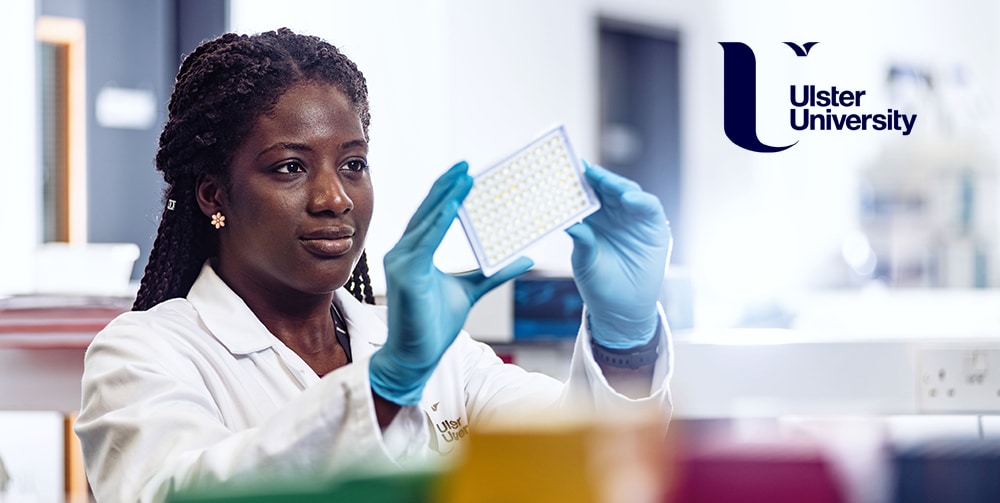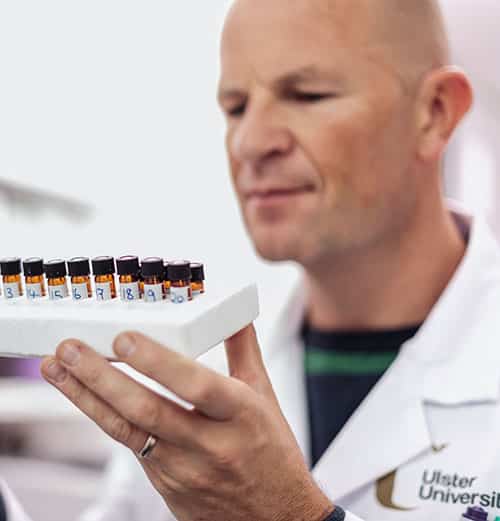Blogs
Keep up with all the latest thoughts and opinions.
We make it happen.
How to become a biomedical scientist
Tuesday, November 29th, 2022

If you are considering biomedical science as a career option or you are already a medical scientist looking to gain further training in the field, our guide on how to become a biomedical scientist will help you take the next step in your career.
Starting out in the field, you’re likely to study for an undergraduate degree and specialise further on a Masters programme such as Ulster’s online Biomedical Science Masters. However, you may have a number of questions before you get started.
Below we cover common questions about getting into biomedical science, aiming to help you better understand how to gain registration and progress in the field.
1. What is a biomedical scientist?
According to NHS Careers, a biomedical scientist is a professional who carries out laboratory and scientific testing in order to support the diagnosis and treatment of disease and illness.
This could be within a variety of different settings and departments depending on your interests and area of specialisation.
These specialisms include:
- Infection sciences (microbiology and virology)
- Blood sciences (clinical chemistry, haematology and immunology)
- Gene sciences (genetic and molecular pathology)
- Cell sciences (histopathology and cytology)
In order to practice as a biomedical scientist in the UK, you must be registered with the Health and Care Professions Council (HCPC). For more information on who is eligible to apply for registration, refer to question 12: ‘How do I become a biomedical scientist?’.
2. What does a biomedical scientist do?
As a biomedical scientist, you could be involved in researching and investigating a range of medical conditions, including but not limited to:
- Cancer
- Diabetes
- Blood disorders
- Hepatitis
- AIDS
Depending on the area of specialism and the focus of your work, as a biomedical scientist you will study and analyse various types of biological samples and your findings will aid patient diagnosis and treatment. You may be involved in:
- Processing and analysing blood, fluid and tissue samples for diseases, abnormalities or poisoning
- Developing and auditing diagnostic testing for improved performance and clinical use
- Liaising with clinical and other healthcare staff in a multidisciplinary team setting
- Studying cell cultures to detect cancers (histopathology and cytology)
- Writing reports and updating records and systems data
- Submitting bids for funding and conducting clinical research
- Conducting quality assurance of investigations
Find out more about the work you could be involved in on the NHS Careers website.
3. Where can a biomedical scientist work?
Biomedical scientists can be found supporting a wide range of healthcare facilities, across various departments. In a hospital, biomedical scientists are critical to the operation of many departments, including operating theatres and emergency treatment.
For example, those specialising in blood sciences may be found in hospital laboratories, laboratories in specialist hospitals, community clinics or blood transfusion services. Alternatively, outside of a clinical setting, you might work in a research laboratory, research institution or university.
4. Are biomedical scientists health professionals?
As a biomedical scientist, you can be considered a registered healthcare professional when you have the formal training, work experience and HCPC registration qualifying you to provide clinical services.
Biomedical science is sometimes thought of as an allied health profession, but due to the nature of the work (inclusive of patient contact and clinical science) along with the specialised qualifications needed, it is more accurate to call biomedical scientists healthcare professionals or healthcare workers.
5. What skills does a biomedical scientist need?
As a biomedical scientist, you will need advanced knowledge of biology alongside the practical laboratory skills needed to conduct strong research. Working in a laboratory or other research setting requires analytical capabilities and complex excellent communication skills.
Additional skills that you’ll need as a biomedical scientist include:
- A flexible and adaptable approach
- Good time management
- The ability to work autonomously
- IT competency
- Problem-solving skills
- Math ability
- Good interpersonal and teamworking skills
During the online Biomedical Science MSc at Ulster, you will learn how to apply a wide range of practical skills for work in the field, and develop the following:
- Improved skills and knowledge to take on greater responsibility in the lab
- Critical awareness of the principles of professional practice, including scientific integrity and ethical issues
- The ability to evaluate the merits and limitations of specialist techniques and independently reflect on your own practice
- Complex problem-solving and adaptability
6. What qualifications do you need to be a biomedical scientist?
To become a biomedical scientist in the UK, you should successfully complete an undergraduate honours programme (such as a Biomedical Science BSc or NHS Training Programme) accredited by the Institute of Biomedical Science (IBMS) or approved by the HCPC. Entry requirements for BSc programmes vary, but universities will usually ask for a Maths GCSE and Biology and/or Chemistry A levels or equivalent.
During your undergraduate degree or following graduation, you’ll also need to gain professional experience in the field through a laboratory placement (sometimes referred to as service training) within an approved setting.*
On this placement, you’ll build your IBMS Registration Training Portfolio which you can then send to the IBMS for certification. With your IBMS Certificate of Competence, you can then submit your application for registration with the HCPC, and, once registered, practice legally as a biomedical scientist in the UK.
*Some programmes such as the NHS traineeship, degree apprenticeships and some BSc programmes offer integrated placements. However, if your undergraduate course does not offer an integrated placement, you’ll need to arrange a placement for yourself, during part-time studies or after graduation.
For more details on required study time, see question 8: How long does it take to become a biomedical scientist.
7. What is HCPC registration, and why is it important?
The HCPC is the UK’s statutory regulator for several health and care professions, including biomedical science. By UK law, anyone wanting to practice as a biomedical scientist in the UK must first gain HCPC registration to prove competency in the field.
To register, applicants must hold an IMBS-accredited (or HCPC-approved) honours degree and a Certificate of Competence (issued by the IMBS) based on a laboratory training portfolio developed while studying or after graduation.
To read more about the role of the IBMS at postgraduate level, see our blog post: Is IBMS accreditation important for a Biomedical Science Masters?
8. How long does it take to become a biomedical scientist?
To become a biomedical scientist, you’ll first need to study for three years on an undergraduate programme, followed by one or two years as a trainee, gaining hands-on experience in the lab and building a portfolio. This means that after at least four years of education and training, you may be eligible to apply for registration with the HCPC and practice as a biomedical scientist.
However, if you enrol on the NHS Practitioner Training Programme, you’ll gain on-the-job training while studying, meaning you could register with the HCPC after just three years.
If you wish to specialise in a specific area and climb up the ranks in your organisation, you’ll need to undertake further study. You can gain a Masters in one to two years full-time or two years part-time. While this is enough to work as a biomedical scientist at mid-level, you can also choose to specialise further by studying at doctoral level with an MPhil (full-time 1-3 years; part-time 2-4 years) and/or a PhD (full-time 3 years; part-time 5 years).
9. What are the career prospects for a biomedical scientist?
Careers in biomedical science vary widely depending on your specialism as well as your qualification level. An undergraduate degree will open doors into the field, allowing for entry-level careers, traineeships and further sponsored training.
As you develop your skills and knowledge, specialised career paths will become available. On-the-job training and further study (such as an MSc followed by an MPhil or PhD depending on your career goals) can lead to successful, lifelong careers.
After graduating with a Masters qualification, the following specialised biomedical science jobs may open up to you:
- Laboratory technician
- Biotechnologist
- Clinical scientist (immunology, haematology, biochemistry)
- Forensic scientist
- Microbiologist
- Research scientist (life sciences, medicine)
To learn more about individual roles, see our ‘What can you do with a biomedical science degree?’ guide.
10. Are biomedical scientists in demand?
Due to the wide scope of biomedical research and increasing global spending on research and development (standing at $1.7 trillion in 2022), biomedical scientists can enjoy extensive job opportunities.
Although UK statistics are hard to come by, in the US, the Bureau of Labor Statistics projects job growth of 17% for medical scientists between 2021 and 2031 – much higher than the average for all occupations.
For more reasons to enter into the field, see our blog outlining 5 reasons to study a Biomedical Science Masters.
11. How much does a biomedical scientist make?
Whatever your role or specialism, biomedical science can make for a satisfying, lifelong career. Though salaries vary widely across private companies, universities and government bodies, according to the UK jobs site Prospects, starting salaries in the NHS range from £25,655 to £31,534 (Band 5).
With added experience and/or specialist knowledge, you can earn an NHS salary of £32,306 to £39,027 (Band 6). Furthermore, as a senior biomedical scientist, you can expect to earn £40,057 to £53,219 (Band 7/8a). Consultant biomedical scientists and those with higher and expert qualifications can earn even more.
12. How do I gain further training after a BSc?
To continue to develop as a professional in the field after gaining your undergraduate degree, you’ll need to specialise. The easiest way to do this is to gain a Masters (MSc) qualification, followed by a doctorate (MPhil or PhD), depending on your career goals.
Furthermore, there are various ways to do this in collaboration with your workplace and without the need for a career break. While most full-time Masters take place on campus, if you want more flexibility, you could opt to study your Masters part-time whilst working as a (trainee) biomedical scientist.
On an MSc, you’ll choose a specialism and learn how to apply research methodologies to complex research projects. Choosing a university with a strong research impact will ensure your learnings are relevant and timely. The higher the level of learning, the higher you can climb within academia and your organisation, conducting advanced research with added impact.
The Biomedical Science MSc at Ulster takes place fully online, allowing you to conduct your research project at your own workplace laboratory and progress your career while at work. The programme is open to working professionals in a range of healthcare science staff roles, including trainee biomedical scientists who have access to a laboratory as part of their work.
13. Gain an IBMS-accredited Masters degree online
Ulster’s online Biomedical Science MSc is one of just a few flexible, part-time programmes around the world that allows working professionals to gain a recognised postgraduate qualification on the job, with the same excellent academic team and student support as our on-campus programmes.
Our course curriculum is relevant and timely, designed by active researchers and biomedical scientists to meet industry demand. Though the programme is taught entirely online, all students must have access to a laboratory in order to conduct their own research and complete valuable work-based research projects.
Study anytime, anywhere in the world and gain an internationally recognised Masters qualification without the need for a career break.


